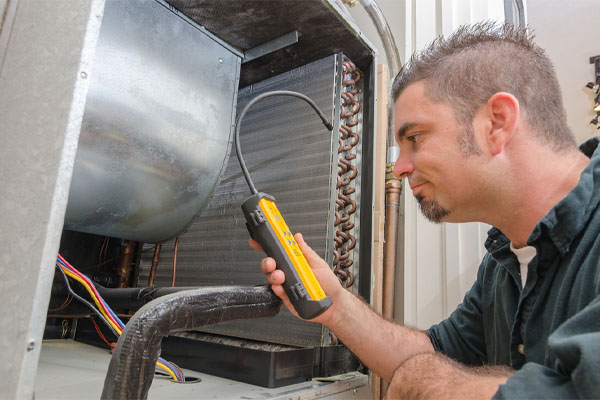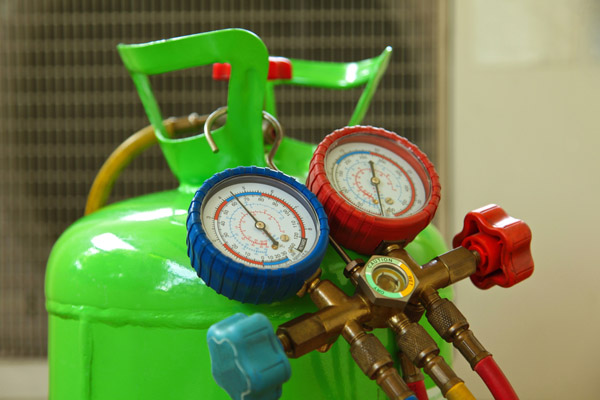What Causes Your AC Refrigerant To Leak?

A refrigerant leak can be an insidious issue because it can be difficult to identify even if it is very common. In HVAC systems, an AC refrigerant leak is usually the main reason for inefficiency which ultimately affects the comfort level of your home. A refrigerant leak can also lead to health issues in the long run. As a homeowner, you should understand how refrigerant leaks happen and why you should keep an eye out for your HVAC system for comfort and safety.
Do I Have An AC Refrigerant Leak?
Contents
To know whether or not your AC system has a refrigerant leak, you need to understand what it is, what it does, and what could cause leakage. You also need to know the possible solutions you could turn to for preventing and fixing the issue.
What Is An Air Conditioner Refrigerant?
A refrigerant or coolant is a compound that is used for cooling air in HVAC systems. It comes in either a gas or liquid state. The compressor in the air conditioning system forces the refrigerant (compounds such as the R-22 and R-410a) through specialized tubes and components. The compressor rapidly compresses the coolant as the system pulls it in. This action traps the coolant molecules within a smaller space, causing them to collide and produce heat. The system then pushes the refrigerant through the component known as the condenser, which removes the heat. Fans within the AC system will also help eliminate heat. The refrigerant is then pushed through to the evaporator to further lower its temperature. When the air passes over the evaporator coil, it is cooled to the desired temperature before it is distributed to an enclosed space or room.
The refrigerant is an important part of the air conditioning system cooling process involving ambient air. If the system loses refrigerant due to a leak or some other cause, its cooling capability will be severely reduced.
Causes Of AC Refrigerant Leak
- Air Conditioner Corrosion: There are metal components inside the AC system. The indoor coil, for example, is lined by copper tubing which is susceptible to corrosion. Once the metal has rust, it becomes weak and could develop holes and cracks from which refrigerant could leak.
- Weakened Air Conditioner Joints And Connections: Aging will occur and cause joints, along with other connections within the AC system to thin out or erode.
- Improper Air Conditioner Installation: An air conditioning system that was not installed correctly will result in ill-fitting parts and components. Gaps between these components could allow the refrigerant to leak out.
- Factory Defects: If the AC unit was assembled or handled improperly at the factory before being shipped out. These factory defects could cause or lead to coolant leakage.
- Normal Air Conditioner Wear-and-Tear: Regular use, along with aging, will inevitably lead to problems with coolant leaking. There are components in the AC system that have rubber seals to protect and seal off air or liquid. Over time, the rubber becomes worn enough, allowing the refrigerant to leak.
How To Identify An Air Conditioner Refrigerant Leak

- Your Electric Bill Is Higher: AC systems that cannot cool down spaces efficiently will have to work doubly hard to achieve the ideal temperature. This will require the system to consume more electricity. The result? Higher electricity bills.
- The AC Unit Takes A While To Achieve The Right Temperature: Since a refrigerant leak affects the cooling capability of the AC unit, the AC will take longer to bring the room temperature down. If your AC is now taking 5 to 10 minutes to cool your room although it used to require only 1 to 2 minutes, there may be an issue with a refrigerant leak.
- Higher Humidity Levels: AC systems are designed to remove excess moisture from the air. If you notice high humidity levels even with the AC turned on, check the system for leaks.
- Frozen Evaporator Coil: The refrigerant is pushed through the evaporator coil so heat can be absorbed. If not enough refrigerant is present, the coil will fail at absorbing a sufficient amount of heat. This allows condensation to form in the coils and later freeze. If you find ice on the evaporator coils, you likely have a leak.
- AC Leak: An actual leak (such as water dripping from the AC unit) is due to frozen condensation found on the evaporator coils. Once this condensation melts, the fluid will drop down and form a puddle on the ground or floor.
- Hissing Sound Coming From Your AC Unit: If your air conditioning system is producing a hissing sound, it likely has holes or cracks. These issues may be found in the coils through which the coolant is circulated. Larger leaks will produce a gurgling sound and if you hear this, then you know that the problem is more serious.
- Low Air Conditioner Airflow: Your AC system will not be as powerful if it does not have enough refrigerant. Not only will it produce insufficient cool air but also insufficient air conditioner airflow.
Is An Air Conditioning Refrigerant Leak Dangerous?
If the coolant leaks through the vents, it can cause a lot of problems. Exposure to coolant leaks through inhalation can cause a number of health issues, including poor concentration, dizziness, loss of coordination, and shortness of breath. It is also likely that you could develop skin rashes. If the coolant touches your skin, you could suffer a chemical burn or frostbite. If you happen to inhale too much coolant, it could cause loss of consciousness or seizures. In severe cases, the effect could be fatal.
Is It Time to Repair or Replace Your A/C Unit?
Some problems may seem so easy to fix that you may think that you could repair them on your own. In a few cases, some steps can help fix the issue. In most cases, however, the cause of the leak may turn out to be far more serious than it seems. Some of the issues that cause leaks require the expert eye of a professional HVAC contractor. You could also void the warranty if you try to fix your AC unit if it is still covered. If you are having problems, it is far better to ask a professional for help.
There is also the business of the R-22 compound, which is a type of coolant that is used in older HVAC systems. R-22 was phased out in January 2020, which means it is not being produced anymore. Whatever is still available is already limited and being sold at high prices. This means that older AC models that still use R-22 will no longer have a sufficient supply of refrigerant to ensure that it runs smoothly. Over time, an older AC will simply run out of a compatible coolant to use.
Other than leaks, older air conditioning units also carry a host of other problems. Topping off an older AC system will cost about 50% of the price tag of a brand new air conditioner that has an ENERGY STAR® certification. If the AC system has a high SEER rating, you are assured that it can perform better, provide you with a higher level of comfort, and save you from the cost of high electricity bills thanks to better efficiency.
Conclusion
A refrigerant leak is not something you can ignore. If the problem is serious enough, you will have to replace it with a newer unit. More serious defects and damages simply will need more serious solutions. If you are having trouble with your AC system because of a leak, it’s time to give your trusted HVAC contractor a call to discuss what your best options are.
Contact Miller Oil Company For Your Air Conditioning Needs

Miller Oil Company is a leading heating and cooling service provider in Hartford County, Connecticut. All our technicians are certified and capable of providing you with a range of top-notch services, including HVAC repairs, installations, tune-ups, and replacements. We can guarantee our clients the best and most competitive heating and air conditioning services in the area. If you are ready to say goodbye to HVAC inefficiency and low level of comfort, give Miller Oil Company a call today and ask about our free, in-home estimate.
Click here to contact us today or give us a call at (860) 745-0326 if you have any questions.